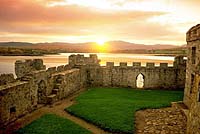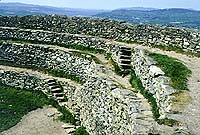Vacation Guide
Ireland golf vacation guide : To do and see
DONEGAL
Abbey of Assaroe – situated just a few miles from Ballyshannon are the scant remains of this 12th century Cistercian Abbey. A centre of learning and piety for over 400 years, mass was celebrated here during penal times. During this time, Catholics faced imprisonment or death for practicing their faith.
Ardara Village – a small picturesque village noted for its beauty and selection of pubs. Ardara has a tradition of hand-woven tweed and hand knitted jumpers. An interesting museum in the renovated Law Courts is to be found down by the bridge.
Atlantic Drive – no visit to Donegal would be complete without undertaking this fascinating nine-mile drive around the Rossguill Peninsula, which commands an ever-changing panorama of some of the finest romantic scenery in the country.
 Doe Castle – stands on the low rocky promontory jutting into Sheephaven Bay on the northern Donegal coast. The MacSweeneys, mercenary soldiers from Scotland took control of the castle in 1440 and it was inhabited up to the end of the 19th century. The castle will shortly be opened to the public.
Doe Castle – stands on the low rocky promontory jutting into Sheephaven Bay on the northern Donegal coast. The MacSweeneys, mercenary soldiers from Scotland took control of the castle in 1440 and it was inhabited up to the end of the 19th century. The castle will shortly be opened to the public.
Donegal Town – in the town centre, stands an obelisk on which the names of the Four Masters are inscribed. These were four Franciscan monks who, between 1632 and 1636 wrote down the history of Ireland from 2242 BC to 1616 AD, a manuscript entitled the "Annals of the Kingdom of Ireland". Written during a period of great strife, the work was undertaken, as it was feared that the ancient records of Ireland might be lost forever.
Doon Fort – situated on an island in Doon Lough, the fort is easily reached by boat and is an important archaeological site but one that is relatively unknown and rarely disturbed by visitors.
Famine Pot – situated in a wooded estate on the banks of Lough Eske, this massive cauldron was made in England and shipped to Ireland during the Great Famine of 1845. The pot was filled with Indian maize and used to feed the starving people in the area. It provides a stark reminder of our past.
Glasbolie Fort – lying one mile north of Rossnowlagh is this conspicuous mound called Glasbolie Fort. According to local tradition, this earthen rampart is the burial place of a 6th century High King of Ireland.
Gleann Cholm Cille (Colmcille’s Valley) – this is a place of historic magnitude and unique tranquility. Born in 521, Colmcille was banished from Ireland for copying the manuscript of Finnéan of Moville. Today, Colmcille’s associations with the valley are celebrated on the 9th of June, the saint’s feast day, when pilgrims walk barefoot across the "Pilgrims Way".
Glenveagh Castle – built in 1870 on the shores of Lake Veagh, the McIllenny family, who made their fortune from tabasco sauce, acquired the estate in 1932. Presented to the Irish State in 1983, the impressive castle and gardens are now run by the Heritage Service.
Glenveagh National Park – hidden behind the Derryveagh Mountains, close to Letterkenny, this is an oasis in a desert of bogs and moorland. On land acquired by John George Adair in 1857, the national park covers almost 25,000 acres and a visit is recommended.
 Grianán of Aileach – built about 1700 BC, this is perhaps the most remarkable of all the prehistoric antiquities of Ireland. It was the seat of the O’Neill clan, chiefs of Ulster and was used as a fortress until the 12th century, when it was sacked by the O’Briens from Clare. Extensively restored in the 1870’s, apart from its historic importance, the view from the battlement is wonderful, with memorable panoramas of Lough Swilly and Lough Foyle.
Grianán of Aileach – built about 1700 BC, this is perhaps the most remarkable of all the prehistoric antiquities of Ireland. It was the seat of the O’Neill clan, chiefs of Ulster and was used as a fortress until the 12th century, when it was sacked by the O’Briens from Clare. Extensively restored in the 1870’s, apart from its historic importance, the view from the battlement is wonderful, with memorable panoramas of Lough Swilly and Lough Foyle.
Holy Well of Doon – located close to Letterkenny, pilgrims have been coming here since penal times. An amazing collection of bandages, pieces of clothing, rosary beads and medals provide evidence of the powerful belief the local people have in the curative properties of its water.
Inishowen Peninsula – stretching out between Lough Foyle and Lough Swilly, this peninsula is one of Ireland’s most northerly points and it embraces all that is best in the County of Donegal. And don’t forget to visit Malin Head, Ireland’s most northerly point.
Lough Derg – legend has it that St. Patrick spent forty days praying and fasting on this island retreat and expelled the evil spirits that infested it. Today thousands of pilgrims come every year between 1st of June and 13th August to continue the tradition of self-sacrifice and penance. Pilgrims spend three days and nights without sleep or food while praying barefoot.
Mahera Caves – impressive and dramatic, these sea caves, situated near Ardara, disappear into the side of the mountain. Folklore tells us that in the 17th century over 100 people fleeing from Cromwell’s forces sought refuge in the caves. A light spotted from afar led to all but one being massacred.
Rock of Doon – situated near Letterkenny, this is where O’Donnell chiefs were inaugurated. The last great chieftain to be inaugurated here in 1603 was Niall O’Donnell, cousin of Red Hugh O’Donnell. Legend tells us that the "Little People" live here and that the King of the Fairies holds court here.
Slieve League – situated close to the village of Teelin, 2,000 feet above the crashing Atlantic waters, on a fine day, the view from the cliff summit is sublime, with its magnificent combination of sea, cliff and mountain scenery. It’s said that once at the summit you will be able to see a third of Ireland.
St. Colmcille Heritage Centre – situated on Lough Gartan, the reputed birthplace of St. Colmcille, this heritage centre is largely devoted to the life of the saint and details the impact the Irish church had on the Continent.
St. Patrick’s Well – set on the shore edge of Assaroe Abbey, near Ballyshannon, is St. Patrick’s Well. Legend has it that if you bless yourself with its water three times, your prayer for a cure will be answered.



